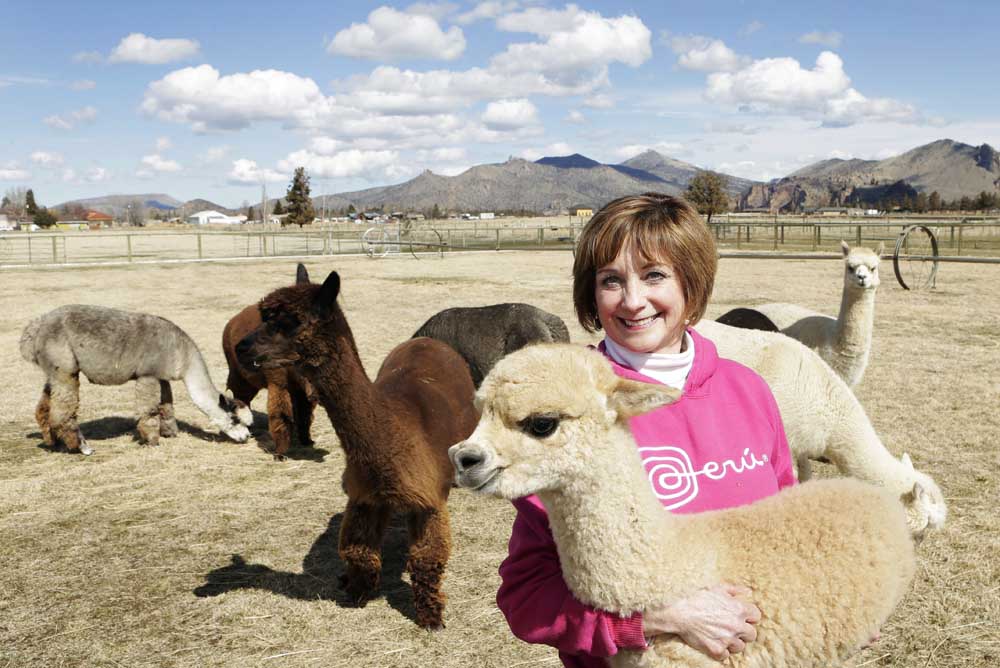Visitors are welcome at alpaca ranch
Published 12:00 am Tuesday, March 20, 2018

- (Joe Kline/Bulletin photo)
TERREBONNE — Two women stand next to a corral fence with their hands full of kibble as an alpaca nibbles away from the inside of the maternity pen at Crescent Moon Ranch.
They are feeding Alkina and Navea, the alpacas who are in their last weeks of an 11-month pregnancy.
Trending
“Morning, ladies,” said Scott Miller, who co-owns the 42-acre ranch with his wife, Debbie.
The ranch, on the east side of U.S. Highway 97 near Smith Rock, has about 150 alpaca raised mainly for their fleece and a small store where people can come see products made of alpaca and buy food to feed the animals.
Encouraging visitors is all part of the agricultural tourism that is a prime objective for the ranch, along with raising alpaca for their fleece, growing hay and selling alpaca breeding stock.
“We’ve always open to the public,” Scott Miller said. “We’ve always felt a responsibility to expose people to alpaca. There is a small group of owners in the United States. Less than 10,000 in the country and less than 1,500 active breeders. Bend happens to be a great place to raise alpacas. There are a large number here.”
Scott Miller talked to The Bulletin about alpaca ranching. His responses have been edited for length and content.
Q: What kind of experience do you need to have to run a ranch?
Trending
A: There’s a lot of people in our industry that raise alpacas that come from diverse occupations and all have taken the time to educate themselves. That’s the most important thing. It’s not so difficult once you’re up and running. There’s always something that you learn in the management of your property, or the care of your alpacas. You have to be open to continued improvement and that’s the case with any business.
As far as the management of the herd, it takes common sense, and you have to think of them as your extended family, not your asset and not just an ornament out on the field that you can get around to when you finally get around to it. We have a basic rule that no one can eat until the alpaca are taken care of. That’s a livestock rule.
Q: Why is Bend a good place to raise alpacas?
A: The dry climate and a little bit of elevation. These guys come from high elevation. There’s a lot of water underground, and we’re able to irrigate through the summer months with established pastures. Alpaca have always been bred for their fleece. They’re members of the camel family. In South America there are four kinds. Two are domesticated: llamas, used for carrying things, and alpaca, for the fleece. And two that run wild. Alpaca are not big eaters, but they eat constantly. They don’t eat a lot.
Alpaca fleece is considered one of the finest natural fibers in the world. It’s moderately fine, as fine fleeces go, but it’s extremely uniform. Very little variation across the fibers. We breed for that uniformity. It’s highly water resistant. Both wool and alpaca are natural fibers but produce a different type of product. Some of the best garments are produced when you take the attributes of wool and add it to alpaca. We find our customers find the stuff we have here that are 100 percent alpaca.
Q: What do you do with the fleece?
A: We send our fleece to a mill. They clean and spin it and we sell all of that as yarn in the store. We sell out every year. We keep some fleece back as raw fleece for people who like to spin or do fiber arts with it. We try to have a little bit of everything. We always felt it was our responsibility to promote alpaca and that’s why we open the ranch to people, so they can interact with them and learn what they’re all about.
Q: Where do you derive your revenue?
A: We get our revenue from breeding stock, the store, the hay, the yarn. All of the things contribute to the way we earn our living. We also sell stud service to others looking to ascertain our genetics or improve their herds in some way. All the alpaca on the ranch are registered and their pedigrees are kept with the Alpaca Owners Association, a not-for-profit corporation that manages alpaca registrations.
— Reporter: 541-633-2117, sroig@bendbulletin.com








